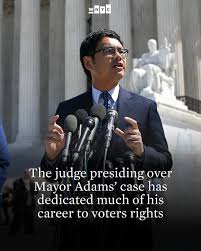U.S. District Judge Dale Ho
Acting Deputy Emil Bove appeared in court to defend his proposal (with defendant's consent) to dismiss the federal indictment of the Mayor of New York for accepting illegal foreign contributions and using that to unlawfully receive New York matching campaign funds. He appeared himself because seven of his subordinates had resigned rather than argue for dismissal of the corruption case against the Mayor.
Because Adams himself consented to the proposed dismissal - a Nolle prosequi - there was no one to argue against the proposal. The Justice Department did not allege a failure of its proofs - simply that the indictment would interfere with his responsibilities as Mayor, and ability to cooperate with the program of deportation as expressed in the Trump Executive Order Preventing Americans from Invasion and as a candidate for re-election. None of these considerations suggests any weakness in the substantive case againsst Adams.
Given the sensitivity and importance of the issue of Adams prosecution and that the rationale for his proposal to dismiss the indictment was not based on legal flaws or factual weaknesses in the proofs of Adams guilt, the issue is novel and of great public importance. On what grounds should a court dismiss an indictment when the grand jury has found probable cause?
Rule 48 (a) of the federal Rules of Criminal Procedure provdes simply "The government may, with leave of court, dismiss an indictment, information, or complaint." But the rule sets no grounds for approval In such circumstances courts sometime appoint counsel - technically as friend of court - because ours is an adversary system.
Judge Ho did that. He named Paul Clement - an interesting choice. Clement is a former Solicitor General of the United States. He has probably appeared more often before the U.S. Supreme Court than has anyone else.
He served under President George W. Bush and is now in his own firm.
His biography (link above) is both impressive and intriguing.
The ORDER apointing Clement defines the issues the judge wants explored:
[T] he parties and amicus curiae shall address:1) The legal standard for leave to dismiss an indictment under Rule 48(a);2) Whether, and to what extent, a court may consider materials other than the Rule 48(a) motion itself;3) Under what circumstances, if any, additional procedural steps and/or further inquiry would be appropriate before resolving a Rule 48(a) motion;4) Under what circumstances, if leave is granted, dismissal should be with or without prejudice;5) If leave were denied under Rule 48(a), what practical consequences would follow, including whether dismissal would nevertheless be appropriate or necessary under other rules or legal principles (e.g., for “unnecessary delay” under Rule 48(b) or under speedy trial principles, see United States v. N.V. Nederlandsche Combinatie Voor Chemische Industrie, 453 F. Supp. 462, 463 (S.D.N.Y. 1978)); and6) Any other issues the parties or amicus consider relevant to the Court’s resolution of the Government’s motion.
Other parties seeking to be heard as amicus must flle by February 28.
Parties and amicus briefs are due March 7. Oral argument set for March 14.
- GWC

No comments:
Post a Comment